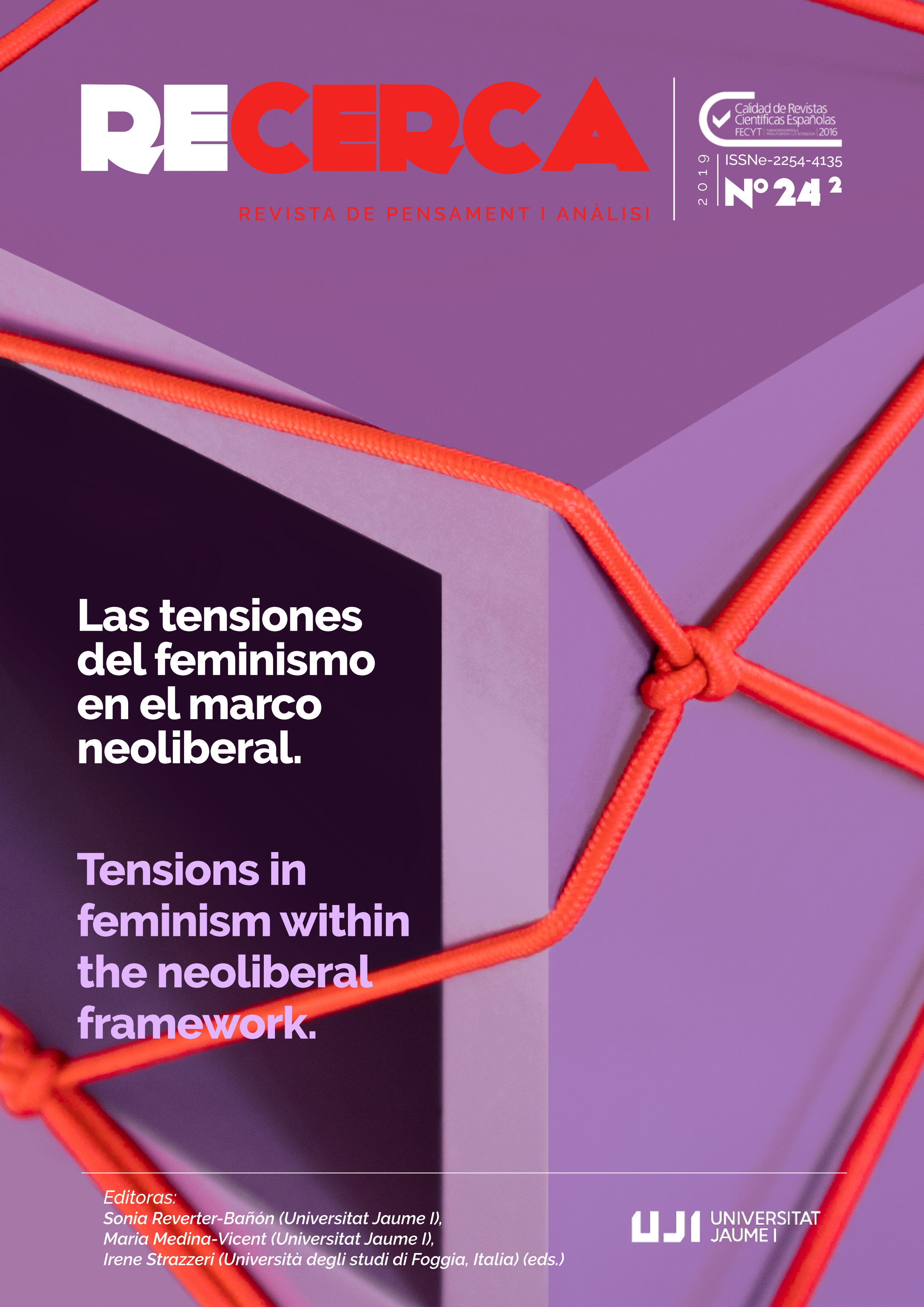La paridad participativa propuesta por Nancy Fraser: ¿Una radicalización de la democracia?
Contenido principal del artículo
Resumen
Este artículo recoge la propuesta de Nancy Fraser de paridad en la participación como criterio que integra las reivindicaciones más valiosas de otras corrientes feministas con el objetivo de ampliar la justicia social en nuestras sociedades neoliberales. Asimismo, muestra los límites de su formulación: Fraser considera los condicionantes sociales que permitirían la realización de la paridad en la participación, pero no analiza en profundidad los condicionantes subjetivos de los que también depende. Por último, se sugiere superar esos límites ampliando el ideal normativo de Fraser con el pragmatismo de Dewey. El objetivo es visualizar aspectos de la justicia ocultos en la propuesta de Fraser en pro de una radicalización democrática.
This article describes Nancy Fraser’s proposal of participatory parity as a criterion for the integration of the most valuable claims of other feminist schools with the goal of increasing social and gender justice within our neoliberal societies. At the same time, it shows its limits: Fraser examines the social constraints that would allow for the implementation of participatory parity, however it lacks a thorough analysis of the subjective constraints on which it also depends. Lastly, it aims to overcome those limits extending Fraser’s normative ideal with Dewey’s pragmatism. The main goal is to highlight aspects of justice hidden in Fraser’s proposal towards a democratic radicalization.
Descargas
Detalles del artículo
Citas
Amorós, Celia y De Miguel, Ana (2010). Teoría feminista de la Ilustración a la Globalización. Madrid: Minerva.
Arendt, Hannah (1961). The Crisis in Culture. En Arendt, Hannah. Between Past and Future: Six Exercises in Political Thought. New York: Meridian.
Benhabib, Seyla (2006a). El ser y el otro en la ética contemporánea. Barcelona: Gedisa.
Benhabib, Seyla (2006b). Igualdad y diversidad en la era global. Buenos Aires: Katz.
Benhabib, Seyla, Butler, Judith, Cornell, Drucilla y Fraser, Nancy (2011). Feminist Contentions. New York: Routledge.
Benhabib, Seyla y Cornell, Drucilla (1990). Teoría feminista y teoría crítica. Valencia: Alfons el Magnànim.
Bernstein, Richard (2010). Filosofía y democracia: John Dewey. Barcelona: Herder.
Butler, Judith (2000). Merely Cultural. New Left Review, 2, 109-121.
Butler, Judith (2007). El género en disputa. Barcelona: Paidós.
Dewey, John (1908). Ethics. En Boydston, Jo Ann (Ed.) (1996). The Collected Works of John Dewey, Middle Works V. Carbondale: Southern Illinois University Press.
Dewey, John (1911). A Symposium on Woman’s Suffrage. En Boydston, Jo Ann (Ed.) (1996). The Collected Works of John Dewey, Middle Works VI. Carbondale: Southern Illinois University Press.
Dewey, John (1916). Democracy and Education. En Boydston, Jo Ann (Ed.) (1996). The Collected Works of John Dewey, Middle Works X. Carbondale: Southern Illinois University Press.
Dewey, John (1922). Human Nature and Conduct: An Introduction to Social Psychology. En Boydston, Jo Ann (Ed.) (1996). The Collected Works of John Dewey, Middle Works XIV. Carbondale: Southern Illinois University Press.
Dewey, John (1930). Individualism Old and New. En Boydston, Jo Ann (Ed.) (1996). The Collected Works of John Dewey, Later Works V. Carbondale: Southern Illinois University Press.
Dewey, John (1934). Art as Experience. En Boydston, Jo Ann (Ed.) (1996). The Collected Works of John Dewey, Later Works X. Carbondale: Southern Illinois University Press.
Femenías, María Luisa (2007). El feminismo postcolonial y sus límites. En Amorós, Celia y de Miguel, Ana (Eds.). Teoría feminista de la Ilustración a la globalización, volumen 3 (155-213). Madrid: Minerva.
Foucault, Michel (1990). The Use of Pleasure. The history of sexuality 2. New York: Radom House.
Foucault, Michel (2015). La ética del pensamiento. Para una crítica de lo que somos. Madrid: Biblioteca Nueva.
Fraser, Nancy (1997). Heterosexism, Misrecognition, and Capitalism: A Response to Judith Butler. Social Text, 52/53, 279-289.
Fraser, Nancy (2000). Rethinking Recognition: Overcoming Displacement and Reification in Cultural Politics. New Left Review, 3, 107-120.
Fraser, Nancy (2011). Dilemas de la justicia en el siglo XXI. Género y globalización. Palma: UIB.
Fraser, Nancy (2015). Fortunas del feminismo. Quito: IAEN.
Fraser, Nancy y Honneth, Axel (2006). ¿Redistribución o reconocimiento? Madrid: Morata.
Fraser, Nancy y Nicholson, Linda (1988). Social Criticism without Philosophy: An Encounter between Feminism and Postmodernism. Theory, Culture y Society, 5, 373-394.
Hamington, Maurice y Bardwell-Jones, Celia (2012). Contemporary Feminist Pragmatism. New York: Routledge.
Janack, Marianne (2000). Feminist Interpretations of Richard Rorty. Pennsylvania State: University Park Press.
Palacio, Marta (2018). Pragmatismo, emancipación y feminismo. Astrolabio. Revista Internacional de Filosofía, 21, 77-99. doi: 101344/astrolabio2018.21.5.
Pappas, Gregory (2008). John Dewey’s Ethics. Democracy as Experience. Indiana: Indiana University Press.
Posada, Luisa (2014). Teoría queer en el contexto español. Reflexiones desde el feminismo. Daimon. Revista Internacional de Filosofía, 63, 147-158. doi: 10.6018/daimon/190041.
Saito, Naoko (1996). Dewey's Idea of Sympathy and Development of Ethical Self: a Japanese Perspective. Philosophy of Education, 1, 389-396.
Seigfried, Charlene-Haddock (2001). Feminist Interpretations of John Dewey. University Park: Pennsylvania State University Press.


